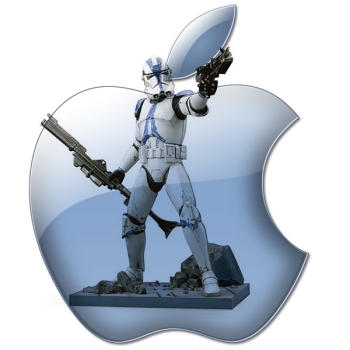PC Industry Episode II: Attack of the Mac Clones


Well, as it turned out, Psystar might have fizzled before any real fireworks began. Still, I have to think that this whole idea of commercially produced Mac Clones has legs -- and Apple's anticipated litigiousness regarding this matter will eventually have to be tested in court, if not with Psystar, then with someone just like them, perhaps some rogue Chinese, Korean or Indian company where American EULAs and contract laws are more difficult to enforce.
I can imagine that many of us veteran PC industry geezers are drawing parallels here to the original PC cloning movement, where the legality was tested in court during the landmark discovery of COMPAQs efforts to reverse-engineer the IBM PC BIOS. As some of you recall, IBM eventually determined COMPAQ "clean-roomed" the BIOS rather than copying it and violating IBM's intellectual property rights and patents, and the rest, as you can see, is history. There is the obvious difference here that Apple owns Mac OS X and the rights to the hardware platform it runs on, whereas IBM had a non-exclusive license from Microsoft which prevented a loophole from being closed, but to use the hackneyed phrase -- when there is a will, there is a way.
Click on the "Read the rest of this entry" link below for more.
I have always said that it made absolutely no sense that Apple backed off from the prospect of cloned systems. For a brief period, during the PowerPC days of the mid 90's, companies such as Power Computing produced clones -- many of which were considered even superior machines to the equivalent Macs at the time for the money -- until Steve Jobs put the kibosh on that deal when he replaced Gil Amelio as CEO in 1997 and the Power Computing assets were purchased. This was a fairly easy thing for Apple to stop at the time, because in order to produce a Mac clone, you needed to license and buy actual Mac firmware chips from Apple.
Fast forward to 2008 - and Macs have now migrated to the Intel platform for over two years. The only thing that stands in the way between Mac OS and viral dispersal of cloned hardware is the legality of running the OS on commoditized parts that any willing and determined PC hobbyist can assemble in their own home. How easy is it? Well, along with legal copies of Mac OS X and a special EFI firmware emulator for PC BIOS-based equipment and instructions how to put it all together it doesn't really require any more effort than what it would have typically taken a PC homebrewer to assemble their own DOS or Windows-based white box 10 or 15 years ago.
If you really want the easy way out and have no ethical quandaries with software piracy, you can get a hacked Mac OS X DVD (just search on "kalyway" or "osx86" on any myriad of torrent sites) that pretty much does the whole thing for you without any OS hacking skills needed whatsoever. There is absolutely nothing special at all about what Psystar purportedly does. If you want a clone Mac or a "Hackintosh" that badly, you can have one, for just a small amount of effort and a very modest cash investment in a relatively generic PC motherboard, processor, RAM, video card and case with power supply assembled from an ever-growing list of compatible parts.
In all likelihood, you probably can run it on the PC you have now, depending on your tolerance for headaches and how many Saturdays you feel like killing to get it tweaked just right to make all your drivers work. Oh, you'll need to be your own support person, and it will probably be more than a little bit messy, but if you are determined to "screw the man" so to speak, than a private citizen can effectively do whatever the heck they want without any interference at all from the Evil Fruit.
We are living in interesting times. Open Source desktop OSes are attracting the curious, and even the most stalwart of Windows supporters are now questioning their allegiances. If Apple were so inclined, permitting Mac OS X to run on generic PC and x86 Server hardware would probably throw an ugly wrench in both the Linux and Windows works. It might not be a huge wrench initially, but I bet the Linux crowd would definitely start to Think Differently if a truly legal Mac OS for X86 generic hardware were allowed to roam free on the Internet, with larger groups of people in the community doing hardware compatibility testing and installation scripting. Don't get me wrong, Ubuntu Hardy Heron is nice and all, but a Mac OS X I could easily and legally install on any random $500-$700 Dell or Taiwanese special from Costco or Wal-Mart? Or run as a Virtual Machine within ESX Server or Xen/KVM? Forget about it. Apple would sell tons of copies, and make many developers very, very happy.
Do you want your own Mac Clone and are willing to go thru the pains of building it yourself? Talk back and let me know.
Disclaimer: The postings and opinions on this blog are my own and don’t necessarily represent IBM’s positions, strategies or opinions.